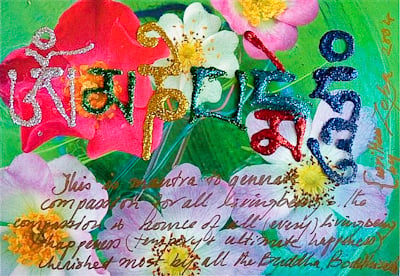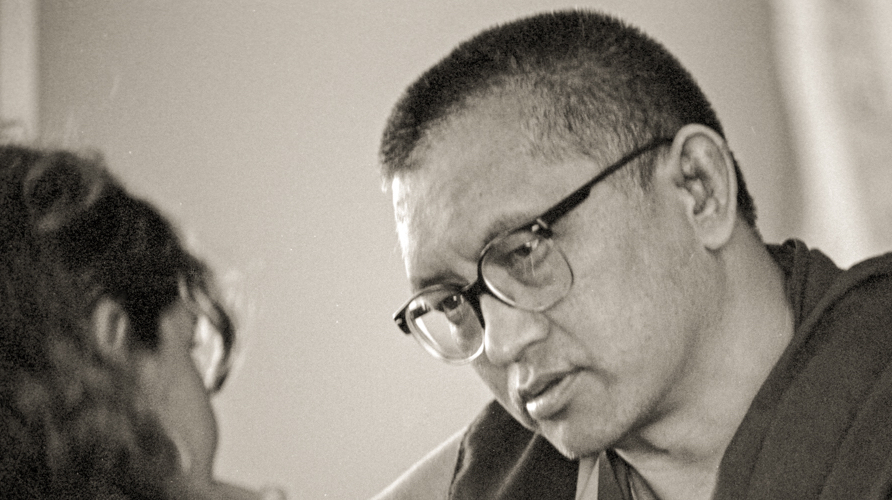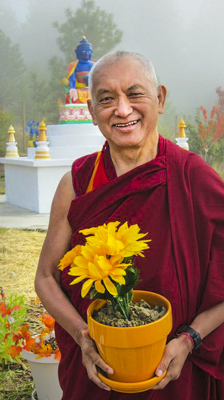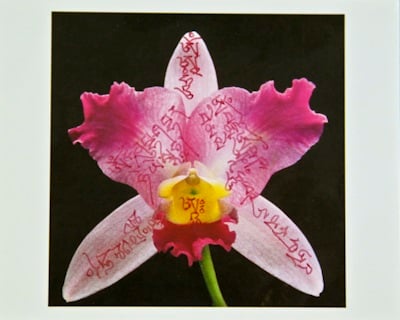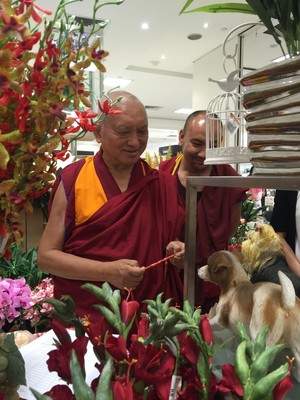My most dear, most kind, most precious, wish-fulfilling one,
Concerning the obstacles to retreat, there’s one incense puja called Riwo sang chö. That’s the Nyingma incense puja, of which there are copies in English, but I don’t think our Sangha know about it. Is there a geshe or lama in the area or nearby that you know of who could do this? The incense you use must have a scented smell, not kaka. Well, you never know, for some the smell of kaka is the best.
Also Drugchuma, this is the sixty-four offerings to Kalarupa. You can ask one monk to do this for you and make appropriate offerings. Tell the monk I am requesting that he does it slowly and well, and to think of Kalarupa as His Holiness the Dalai Lama.
Regarding advice for your retreat, first thing in the morning do my morning practice, How to Make My Lives Wish-Fulfilling: The Method to Transform a Suffering Life into Happiness. This changes the kaka life and transforms it into gold. Your life transforms into a wish-granting jewel and the cause of enlightenment, by generating bodhicitta. This should be done every morning when you open your eyes. Do this first when you wake up in the morning.
Also read the Diamond Cutter Sutra twice before the retreat. Before that, there are several mantras to increase the [merit]. These mantras are in my morning prayers [Method to Transform]; they should be there. There are several mantras to increase the merit by so many hundred millions. So do those things, then it becomes many numbers.
Regarding your question about study: studying Madhyamaka is the best thing you’re doing. The best thing is to study with Geshe Namdak, because he is a Western person who knows Western life and how to explain [Dharma].
What you said about gold is correct, and not just gold, but a wish-granting jewel. Without realizing emptiness, there’s no way to be free from the oceans of samsaric suffering; there’s no way to eliminate the root of samsara, the ignorance holding “I” as truly existent, real. Also, without realizing emptiness, even with bodhicitta, we can’t cease the subtle obscurations. So it’s done by realizing emptiness directly.
Just having bodhicitta alone we can’t cease [the subtle obscurations] directly, so it’s really incredibly important [to realize emptiness]. There is no money to value it, we can’t even value it with money. For three countless great eons, if we collect one billion dollars each hour, there’s no [comparison].
To realize the meditation on emptiness, we need to really have the correct understanding, the Prasangika view, that everything—I, action, object, samsara, nirvana, happiness and problems, enlightenment and hell—exists in mere name. Nothing exists from its own side, even the size of an atom. Everything exists in mere name; everything exists merely labeled by the mind. Everything exists from the mind, merely labeled.
In the Svatantrika Madhyamaka view, they accept “labeled” but they can’t accept merely labelled. For them it’s following nihilism. But in the Prasangika everything exists in mere name; nothing exists from its own side; everything exists in mere name. So don’t follow nihilism and don’t follow eternalism. Emptiness and dependent arising are unified, existing. If anything exists, it has to be empty from its own side; anything that is empty, from its own side it has to exist in mere name.
This is the most unbelievable, unbelievable shock, because we haven’t realized it since beginningless rebirths and it didn’t get developed. Only in this life, we are most unbelievably fortunate even to hear the teachings, the Prasangika view, and we have the opportunity to think and to realize emptiness. Not only that, we can see that those who have realized emptiness are few, almost nothing.
All those who are suffering in the six realms—there is unbelievable suffering of the hell beings, hungry ghosts, animals, human beings, suras and asuras; the oceans of suffering in each realm. And not only now, but they also experienced this suffering from beginningless rebirths—wow, wow, wow, wow—by believing the I is real, existing from its own side.
So action, object, everything that I said before, we think things exist from there, from their own side, but there’s nothing there, they exist only from the mind. Nothing is there [from its own side]; nothing is there. So what you need to think in the early morning when you do the motivation, is [meditate] on bodhicitta and emptiness, beginning with emptiness.
For the rest of the day, while you are eating or making pipi and kaka, or while you’re washing, or while you’re walking or jogging, whatever you’re doing, remember this practice, this mindfulness. Even if you haven’t realized [emptiness], try as much as possible.
We have to train our mind in this, to change our mind, to [realize] this ultimate reality, rather than being habituated since beginningless rebirth in the non-existent I, the non-existent action, the non-existent object, where non-existent means the real one, existing from there. That’s what we have to realize is empty.
That’s why we study Madhyamaka; that’s why we take refuge and do everything to achieve enlightenment for sentient beings, to free the sentient beings from the oceans of samsaric suffering and bring them to enlightenment.
We have to realize emptiness. We have to change our mind, what we believe, from that into this, the mindfulness of the ultimate reality. So that should be one of the main meditations, besides bodhicitta.
Then there’s samsara, seeing that it’s always in the nature of suffering. Then based on impermanence and death, which is very important for us beginners. Impermanence, death can happen anytime, even when we go to the bathroom to make pipi, we’re not sure if we can come back.
As you know, maybe it was Kadampa geshe Ben Kungyal, or Geshe Khamlungpa, there was a thorn bush near the door of his house, and every time he went to the bathroom, his robe would get caught on the thorn bush. He thought about cutting it, but then he also thought, “This may be my last session and maybe I’ll die.” He thought he may die; he may not come back from the toilet or from the last session. So the thorn bush never got cut in his whole life; it was always left like that.
That’s the basis of renunciation for us, especially to meditate on that. That’s the basis of renunciation and the basis for us especially to meditate on that. Only then, the actions of body, speech, and mind have the possibility to become Dharma. Otherwise, our life is filled with worldly concern and attachment to this life, to be famous, to have a good reputation, for other people to praise us, for any disease to be cured, to have a long life, and so forth. Our life doesn’t become Dharma; if our actions are done with nonvirtue they don’t become holy Dharma, they become worldly dharma.
We can see why this is so difficult, because since beginningless rebirths we have become habituated in the wrong way, seeing the hallucination as real, and now we have to turn back and practice mindfulness. What we have been believing until now has been a hallucination, and what we’ve been thinking [is real] does not exist. The ultimate reality [is that phenomena] don’t exist, while merely labeled phenomena do exist. So we have to practice mindfulness that what we’ve been thinking is real does not exist. So we have to change the reality.
[In response to the student's question about doing retreat with their teacher:]
In the monasteries, the guru-buddha, the omniscient one, covers all existence. The subtle mind is everywhere, therefore the subtle wind is everywhere, the Buddha’s holy body is everywhere. The Buddha is everywhere, the guru is everywhere.
If you understand that the guru is the embodiment of all the buddhas’ holy action, working for every sentient being—numberless sentient beings, numberless hell beings, numberless hungry ghosts, numberless animals, numberless humans, numberless suras, numberless asuras, and numberless intermediate state beings—therefore it’s not only you.
Please recite the first stanza of Kyabje Pabongka’s Calling the Guru from Afar many times. That is the real meaning of guru.
So many people, especially many Westerners who have devotion to the guru, relate only to the physical body, not the mind. And there are those who have attachment just to the body, then they get angry when the guru passes away, because it looks like the guru left them. That verse is for those who have attachment. I have experience of that, that’s all.
Regarding what to practice for what’s left of this life. You met Dharma a long time ago, so you’re supposed to understand, but I think you’re thinking more precisely now about Dharma, holy Dharma.
Of course, in Madhyamaka, it’s said that the understanding of ultimate view and bodhicitta, the conventional thought of bodhicitta, the thought to achieve enlightenment in order to enlighten all the sentient beings, and free them from samsara, those two are like wings. If we have two wings we can go far, like an eagle, and we can cross the mountains. We can go very far and wherever we like.
So it’s like that with these two wings: absolute bodhicitta and conventional bodhicitta. With two wings we can cross samsara, [remove] the subtle obscurations and go to enlightenment. This is the basis of tantra. That’s my answer.
In this life we should have the aim to realize emptiness and bodhicitta, the basis of tantra. There are people who meditate only on the chakras, the winds and the drops, and do the yoga exercises, and they leave out bodhicitta, emptiness and renunciation. They don’t regard those things and kind of leave them out as something small, something lower, so then they can never achieve enlightenment.
I’m not sure, but without renunciation, even if we practice dzogchen, we cannot be free from samsara, not sure. If our actions do not become holy Dharma, by avoiding the worldly concerns, the attachment to this life, then our practice doesn’t even protect us from the lower realms. Our practice, what we do with our body, speech, and mind, becomes a cause of the lower realms.
Even though we’re in retreat, in the Himalayan mountains, and we don’t see people, animals or birds, or we don’t sleep, or don’t eat, but then our motivation is just to get power, to become famous, to have a long life, to be healthy, wow, wow, wow, that’s the life of worldly concern, so nothing becomes Dharma, holy Dharma, even if we recite mantras for the whole life.
Without realizing emptiness, without meditating on emptiness, everything becomes a cause of samsara. Even if we practice dzogchen or dzogrim, the chakras, winds, mind, the drops, without bodhicitta nothing becomes the cause of enlightenment; nothing becomes the cause to benefit every sentient being in order for them to achieve enlightenment.
Since you received the commentary of Tara, that’s great, so you can do more of the practice of Tara, the elaborate sadhana. Do more of that meditation. But you have to spend more time on bodhicitta and emptiness.
Even if you are with the enemy, friend or stranger, whatever you are doing, going to meetings or whatever, if other people complain about you or praise you, at that time think, “In reality that’s the ‘me’ that I’ve been believing in since beginningless rebirths, the real me, but there’s no real me. It’s totally opposite to that.”
So meditate that there’s no real me, there’s no real enemy, there’s no real friend, there’s no real stranger, there’s no real world, no real America, no real Shiné Land. This is what you think. When you go shopping, think there’s no real road, there’s no real car, there’s no real money, there’s no real shop, there’s no real material things, whatever you are buying, there’s no real shopkeeper, so everything that exists is what is merely labeled by the mind.
This is something we don’t think normally. We might even think things don’t exist. What we think [is real] doesn’t exist and what doesn’t exist we believe is real, totally opposite. This is what we’ve been doing since beginningless rebirths. Now you understand. This is what emptiness means, the meditation on emptiness.
This is a huge shock, so it totally changes our wrong belief from beginningless rebirths, believing what is wrong. But it changes now, right now, right now, this second. So we can live life with this new belief, that everything exists in mere name.
First start with oneself, thinking “There’s no real me.” If we’re able to think this over and over, if we meditate on this, then we won’t be reborn in the lower realms. We will not only be free from samsara and become enlightened, but [if we meditate on emptiness] in the right way, we won’t get reborn in the lower realms.
It’s so powerful, that however much negative karma we’ve created—even if we killed our father, mother or an arhat, caused blood to flow from a buddha, or caused disunity in the Sangha—even if we’ve done that, if we meditate on emptiness, then we won’t get reborn in the lower realms. It’s unbelievably powerful purification.
There’s so much benefit to meditating on emptiness. It’s unbelievable, unbelievable. You won’t believe it; you’ll be totally fainted forever. You’ll be eating only ice cream, not pizza, no hamburgers, no chicken, no fish, no pork. That’s all.
Thank you very much. You are most welcome to enlightenment.
Cittamani Tara is a very, very blessed practice, and it is said that all the Guhyasamaja importance is inside this, so it’s very, very important, really important. You are lucky to be able to meditate, very lucky. So be a lucky girl continuously, be a lucky girl. Haha! See you soon.
With much love and prayers ...
























